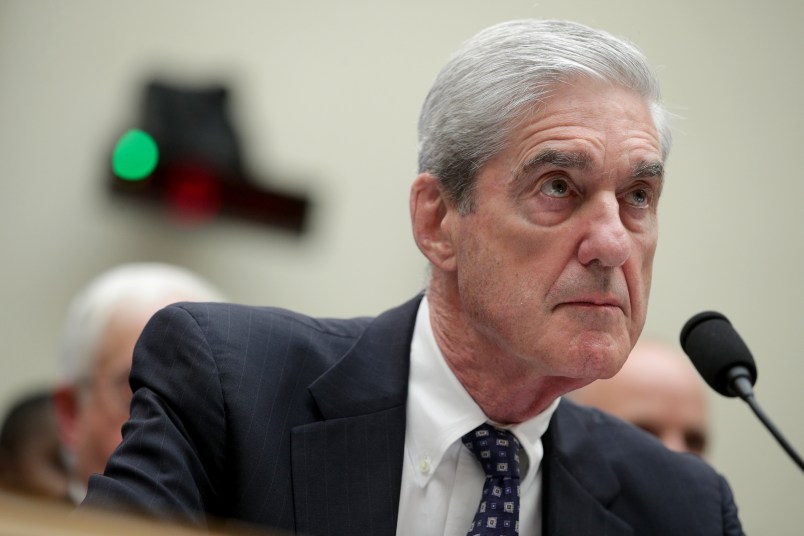This article is part of TPM Cafe, TPM’s home for opinion and news analysis.
After approximately seven hours of testimony on Wednesday before two separate congressional committees, Robert Mueller has finally ended his involvement in the Russia investigation and probe into possible obstruction of justice by the President.
In a sometimes stilted and unpolished manner, Mueller confirmed through his testimony three things: First, the Trump campaign was a willing recipient of Russian assistance in the 2016 election, even if that conduct was insufficient to justify a criminal charge; Second, the President repeatedly engaged in obstructive acts to impede Mueller’s ability to conduct his investigation, including what could arguably qualify as conspiracy to suborn perjury and engage in witness tampering; And third, Mueller and his team were restricted by Justice Department policy from even contemplating whether the President should be indicted.
Mueller’s job is finished. He did all that he was arguably permitted to do under the law. The question that remains is whether the exhaustive investigative report he provided warrants further political action by Congress through a formal impeachment inquiry.
For the reasons hinted at by Mueller during his testimony, I would argue that the answer is yes.
The standing Justice Department policy, as originally outlined in the 1970s and reaffirmed at the close of the Clinton administration, is that a sitting president cannot be indicted. Mueller’s team approached their inquiry knowing that while this policy narrowed their prosecutorial options with respect to the President, it concurrently allowed for the compilation of an evidentiary record for consideration by the political branch — i.e., Congress. It was with that in mind that Mueller’s team pursued and obtained such a wide range of information from people within the President’s inner circle, including White House officials and senior campaign staff, and ultimately delineated ten specific “obstructive” acts in Volume II of their report.
At several key points in his testimony, Mueller returned back to the policy limitation his team faced when explaining why he resorted to a conclusion that he merely could not “exonerate” the President. At first blush, the bipartisan frustration with this non-conclusion makes some sense. For Republicans, it appears to serve as a bureaucratic smear of an American citizen by accusing the President through innuendo of possible criminal conduct but not actually indicting him (which would allow the President to subsequently defend himself in court). For Democrats, it left them in an uncomfortable in-between spot, not quite providing them with the eye-popping headline they needed to push headlong into an impeachment inquiry.
In his testimony, however, Mueller explained that the non-exoneration statement was arguably his only option given the unique constitutional circumstances he confronted. The prohibition on indicting a sitting president meant that even if Mueller felt he had enough to indict the President, he nonetheless still could not memorialize that legal determination in writing – even as a recommendation to the Attorney General – without unfairly smearing the President in the eye of the public. He could not conclude whether charges should be pursued or declined. Yet, because there was substantial evidence that could potentially serve as a basis to pursue an indictment after Trump leaves the presidency, Mueller also could not “exonerate” the President.
The situation cries out for a political resolution, not a criminal one, and it was for that reason that Mueller’s team handled the drafting of their report in the manner that they did. Mueller’s testimony today drove this home. Whatever judgment Congress, and ultimately the American voters, renders with respect to the President is beyond Mueller’s responsibility or duty. Mueller’s role was to provide us with the facts, as best he could, in an expeditious manner.
The task of bringing this to a close now falls on the rest of us.
Bradley P. Moss is a partner at the Washington, D.C. Law Office of Mark S. Zaid, P.C., where he has represented countless individuals, including whistleblowers, serving within the intelligence community. He is also the deputy executive director of the James Madison Project, through which he has represented media outlets such as Politico, Gawker, Daily Caller, and the Daily Beast in FOIA lawsuits against the Bush, Obama and Trump administrations.







The situation cries out for a political resolution, not a criminal one
Why not both?
Sorry Mr Moss but Ms. Pelosi said no to impeachment. And that’s because there aren’t the votes in the Senate to convict.
Now back to business:
That’s What Matters
Josh Marshall
Among other things, these two hearings illustrate a basic, important point. Obstruction is very important. But the real issue is the collusion, the active encouragement and acceptance of help from a foreign power. In other words, the underlying substance.
Obstruction is important in large part because it blocked getting the full story. The most important point here has never been narrowly statutory crimes. It’s the President’s betrayal of his country to get elected. That’s what matters.
…
Indeed
And it is exactly what folks here, me included, have been yelling about for three years more or less.
Mr Moss…
The political solution is impeachment. The legal one happens after trump is out of office, sir. It isn’t a difficult concept. It happens to be how the system is set up and is supposed to work.
Sheesh!
Is civics taught anymore or has it been ignored? I took a civics class in 8th grade, if memory serves.
" Now Congress Must Launch An Impeachment Inquiry."
Not according to Madame Speaker.
REALLY PEOd. And disgusted with Leadership ?
Call. It’s simple and vital.